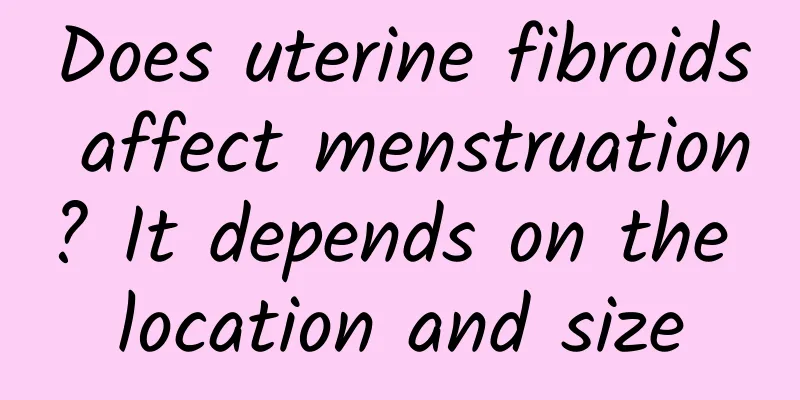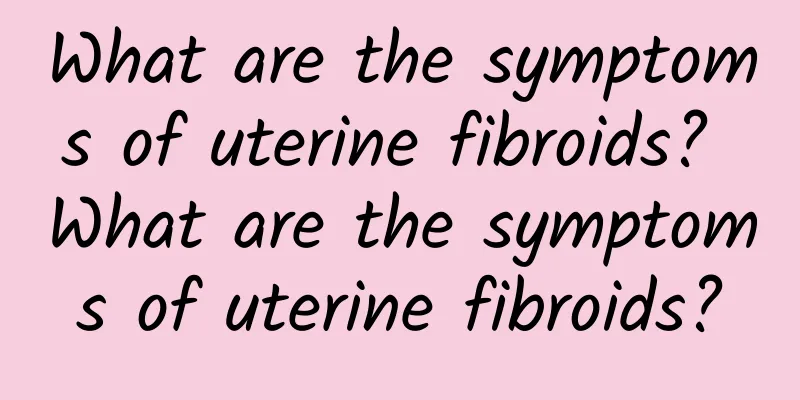Does uterine fibroids affect menstruation? It depends on the location and size

|
Uterine fibroids are one of the most common gynecological diseases. Once you have this disease, the secretions in your vagina will increase significantly. You will feel abdominal discomfort, and sometimes you will have irregular vaginal bleeding. In more serious cases, you will also have back pain. So, does uterine fibroids affect menstruation? 1. Does uterine fibroids affect menstruation? 1. Submucosal fibroids or large myometrial fibroids can affect menstruation The impact on menstruation depends on the location and size of the fibroids. If the growth location is under the mucosa of the endometrium, even if it is very small, it will cause changes in the morphology of the uterine cavity and increase the area of the endometrium, thus affecting normal menstruation and causing excessive menstrual flow or prolonged menstruation. The same is true for uterine fibroids growing in the myometrium, which will increase the area of the endometrium and affect menstruation. The menstrual flow will become more than before, and the menstrual period may also be prolonged. 2. Small myometrial fibroids and subserous fibroids do not affect menstruation If the uterine fibroids grow in the myometrium but are not very large, this situation generally will not affect menstruation. If it is a subserous uterine fibroids, no matter how large the tumor is, it generally will not affect menstruation. There is no need to worry about excessive menstrual flow or prolonged menstruation. 2. What are the effects of uterine fibroids on menstruation? 1. Excessive menstrual flow or prolonged menstrual period If you have uterine fibroids, the area of the endometrium may increase, so a large amount of endometrium will fall off, which will significantly increase the menstrual volume. Some patients may also experience prolonged menstruation. If the menstrual volume is too much for a long time, it is likely to cause anemia, and then cause adverse symptoms such as pale complexion, dizziness, and physical fatigue, which seriously endangers your health. 2. Decreased menstrual flow or amenorrhea If the uterine fibroids are large, they may cause compression to the uterine cavity, which will also affect menstruation. The main consequence is a decrease in menstrual volume. If the condition is too serious, it may directly cause amenorrhea. |
<<: Can I still have children after myomectomy? Most of them do not affect
>>: Can female ovarian cysts be cured? Surgery is necessary
Recommend
careful! Fat people's brains age 40% faster without them realizing it
Obesity can easily lead to metabolic syndrome, an...
Experts teach you how to properly care for pelvic inflammatory disease
As women's life and work pressures increase, ...
What are the dangers of bacterial vaginosis?
1. Cause infertility Bacterial vaginitis can easi...
Abdominal pain is common with adnexitis.
Adnexitis usually causes abdominal pain. The degr...
What is uterine fibroids? How to treat uterine fibroids? What is the cause of this disease?
What is uterine fibroids? How to treat uterine fi...
How to eat dinner to lose weight? High-fiber vegetarian diet will definitely make you thinner
[Core Tip]: What is good to eat for dinner when l...
Why do I suddenly have side abdominal pain when running? 4 reasons to let you know
Feeling guilty about eating too much at the dinne...
How is congenital absence of vagina diagnosed?
How to diagnose congenital absence of vagina? Thi...
Women with irregular menstruation are more likely to develop diabetes
Adult women who have long but very irregular mens...
A new weight loss tool helps you lose 10 kg in a month! Endoscopic sleeve gastroplasty is safe and effective in improving metabolic syndrome
Obesity is one of the negative factors that affec...
Hyperprolactinemia diagnostic reference standard
Hyperprolactinemia is the most common disease in ...
3 ways to create a small buttocks: lift your legs and slim your buttocks
I often hear women complain: "My butt is too...
1 in 3 men has a big belly: 5 tips to avoid metabolic syndrome
"Dad, I love you... But, Dad, haven't yo...
How is dysmenorrhea diagnosed?
How to diagnose dysmenorrhea? Dysmenorrhea is a c...
Brief analysis of the typical symptoms of atrophic vulvar leukoplakia at different stages
Many people may feel unfamiliar with atrophic vul...









